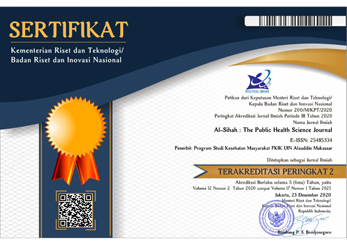Influence of Cannabis Decriminalisation on Consumption Patterns
A Qualitative Case Study in Eastern Cape, South Africa
DOI:
https://doi.org/10.24252/al-sihah.v17i1.54520Keywords:
cannabis, consumption patterns, decriminalisation, hallucinogens, south africaAbstract
Earlier research has frequently neglected regional consumption patterns and socio-cultural dynamics following cannabis policy shifts, particularly in low- and middle-income countries. This study seeks to address this gap by examining cannabis use trends following decriminalisation in South Africa, thereby offering novel insights into community-level behavioural changes. The objective of this study was to investigate changes in cannabis consumption trends in the Eastern Cape province following national decriminalisation. A qualitative case study design, guided by the interpretivist paradigm, was employed to explore contextualised user experiences and perceptions. Data were collected through focus group discussions and in-depth interviews conducted in historically recognised cannabis-growing areas within the OR Tambo District Municipality of the Eastern Cape. A purposive sampling strategy was employed to recruit 55 participants representing various governmental and community stakeholders. The findings suggest that the decriminalisation of cannabis has led to increased production, which in turn has contributed to heightened consumption patterns, particularly among the youth, including minors. Additional concerns have emerged regarding the availability of high-potency cannabis strains and derivative products. As a result, public health education initiatives and regulatory frameworks are essential to ensure optimal consumer safety and public health protection. The insights generated from this study can inform policymakers in developing evidence-based cannabis policies. Furthermore, a nuanced understanding of post-decriminalisation consumption patterns will assist in assessing public health risks and formulating strategies to mitigate associated harms.
Downloads
References
Afeworki, R., Smits, J., Tolboom, J., & van der Ven, A. (2015). Positive effect of large birth intervals on early childhood hemoglobin levels in Africa is limited to girls: cross-sectional DHS study. PLoS ONE, 10(6), 1–14. https://doi.org/10.1371/journal.pone.0131897
Blake, A., & Nahtigal, I. (2019). The evolving landscape of cannabis edibles. Current Opinion in Food Science, 28, 25-31. https://doi.org/10.1016/j.cofs.2019.03.009

Downloads
Published
How to Cite
Issue
Section
License
Copyright (c) 2025 Ovuwa Luvhengo Munyadziwa Nethomboni, Kebogile Elizabeth Mokwena

This work is licensed under a Creative Commons Attribution-NonCommercial-ShareAlike 4.0 International License.
Authors retain copyright and grant the journal right of first publication with the work simultaneously licensed under a Creative Commons Attribution-NonCommercial-ShareAlike 4.0 International License that allows others to share the work with an acknowledgment of the work's authorship and initial publication in this journal.
Authors are able to enter into separate, additional contractual arrangements for the non-exclusive distribution of the journal's published version of the work (e.g., post it to an institutional repository or publish it in a book), with an acknowledgment of its initial publication in this journal.
Authors are permitted to publish their work online in third parties as it can lead to wider dissemination of the work.













